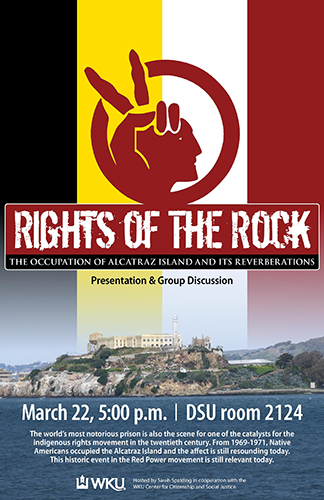WKU News
WKU student & CCSJ to host 'Rights of the Rock' presentation on March 22
- WKU Center for Citizenship and Social Justice
- Monday, March 19th, 2018

Rights of the Rock: The Alcatraz Occupation and Its Reverberations, a presentation and group discussion hosted by Sarah Spalding in cooperation with the WKU Center for Citizenship & Social Justice, will begin at 5 p.m. Thursday (March 22) at Downing Student Union, room 2124.
The presentation by Spalding, a senior English Literature major and Citizenship & Social Justice minor, will focus on how Alcatraz has impacted the indigenous rights movement in America, how it may have connections to the African American rights movement, its connection to modern activism, and the ways in which it sparked a discussion over Native American affairs during the Nixon Administration. A forum for discussion, interactive question and answer and a free-flow of processing and interpretation will follow the presentation.
“I believe that this will help to create awareness for the indigenous rights movement and its origins, as well as making cross-movement connections exploring what it may mean to say that a work of activism may have technically failed, but can still be impactful,” Spalding said.
This project will start a conversation about the origins of the indigenous rights movement through the 1969-1971 Occupation of Alcatraz Island. The impact of this event on the socio-political climate of the 1970s and beyond is little known to the public. Students and faculty could benefit from becoming informed on this topic so that it can be applied to modern indigenous rights events.
With the goal of creating awareness for the indigenous rights movement and providing visibility for the history of struggle for the Native American people, the project will culminate into a published thesis that will be made available to the university community and to the general public. In this way, the project will have an ongoing impact in that it will potentially generate awareness and be a resource that details the impact of the Alcatraz Occupation and shows how movements that technically fail can still be impactful.
“My goal in this presentation is to call attention to a fascinating event in our nation’s history that was a transformative group’s struggle that is little recognized: our Native American population,” Spalding said. “The Alcatraz occupation of 1969-1971 changed the way that the U.S. government dealt with and respected the American Indian population and really ignited what’s termed the ‘Red Power Movement.’ Secondly, I’d like to hear thoughts from the audience on how Native American rights in the 1960s mirror other civil rights movements of the time and how that may be translated into our modern society as well. I’d love to hear some discussion from those who attend.”
The event is free and open to the public. This is a swipeable event.
Contact: Sarah Spalding, sarah.spalding480@topper.wku.edu
Some of the links on this page may require additional software to view.

